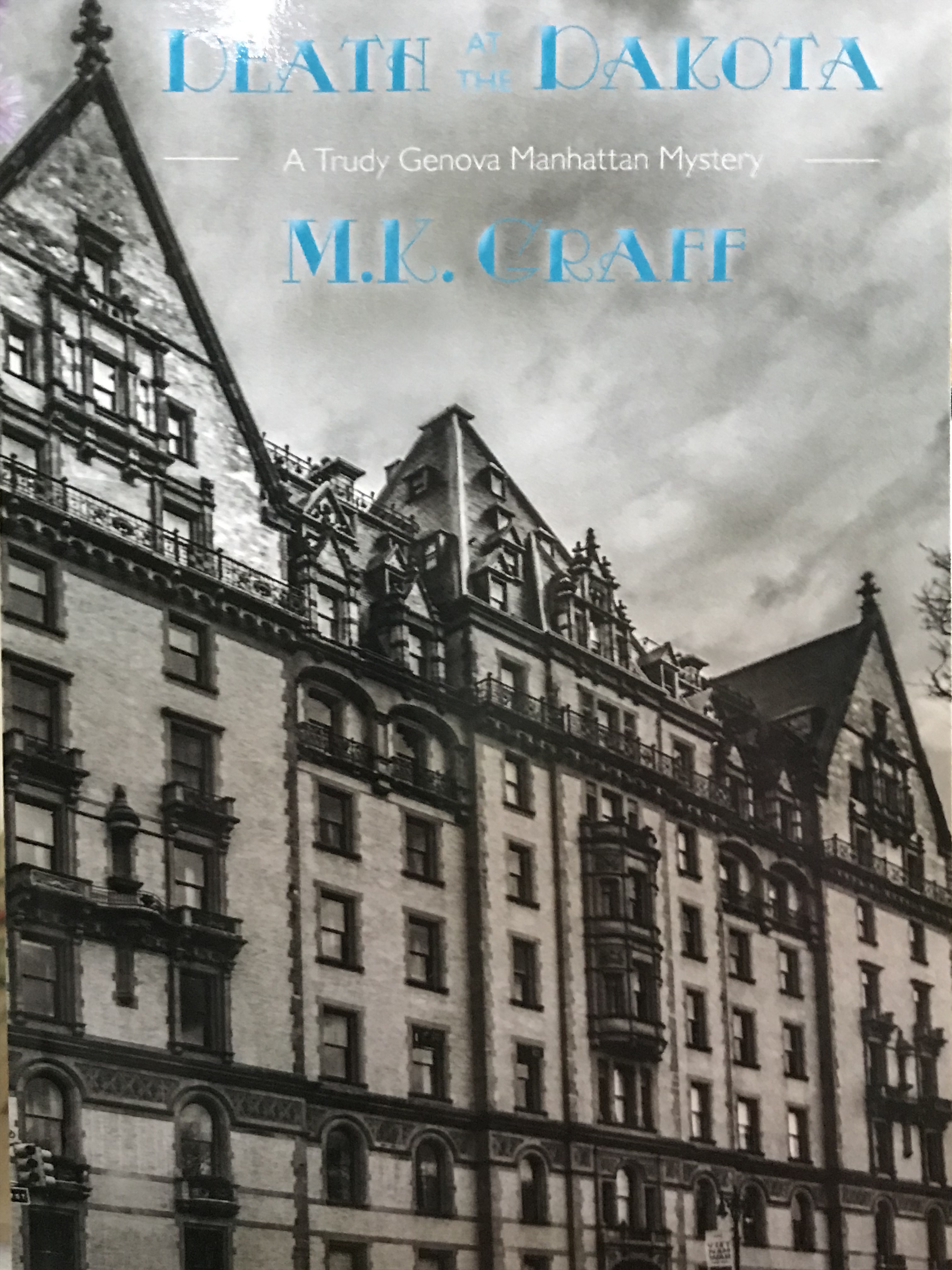British author Emma Jameson has a new series premiering. The Dr. Benjamin Bones mysteries start out with Marriage Can Be Murder. 
On the eve of World War II, Dr. Benjamin Bones is at war with himself.
While most young men are being sent away to fight the Germans, Ben is chosen to serve on English soil. Ordered to move to wild, beautiful Cornwall, he must trade his posh London office and stylish city life for the tiny village of Birdswing, population 1,221 souls.
But leaving his home and shelving his career ambitions aren’t the only sacrifices facing Ben. His unfaithful wife, Penny, is accompanying him to Cornwall in a last-ditch effort to save their marriage. But moments after their arrival, Penny is run down in the street, and Ben is almost fatally injured. And while the villagers assume Penny’s death to be an accident, Ben quickly deduces it was murder.
As he convalesces in Fenton House, which the locals call haunted, Ben meets Birdswing’s eccentric inhabitants. Mr. Gaston, the volunteer air warden, obsessed with defending his remote village against Nazi spies; Mrs. Cobblepot, a thoroughly practical housekeeper who believes in fairies; and Lady Juliet Linton, a prickly, headstrong aristocrat who won’t take no for an answer.
While adapting to life during Britain’s “War at Home,” a time of ration books, victory gardens, bomb shelters, and the Blackout, Ben sets about solving the mystery of Penny’s murder—with a little help from Lady Juliet and the Fenton House ghost.
As a special treat for Auntie M readers, Jameson has provided an excerpt of the new book:
10 October, 1939
Ben didn’t need to leave his room over the Sheared Sheep to know it was getting colder; he felt it every time a southeaster blew through, penetrating the late Victorian heap as easily as a torn mack. Downstairs, raucous laughter and pint-fueled rows started in midafternoon and carried straight through till closing. After the issuing of the Call-Up Proclamation, it seemed most of the village’s young men were heading into the pub a little earlier each day, either to drown their fears or enjoy what might be a final pint with friends. Ben often overheard long snatches of conversation, provincial and circular in nature, that did nothing to entice him downstairs. And if not for the insistence of his nurse, a curt sister with very definite views on the curative power of sunlight, he would have kept his blackout screens in place night and day. What difference did it make?
The words of the publican, Angus Foss, floated up from the barroom. That is, if the perpetually aggrieved tones of a perpetually aggrieved Scot can ever be said to “float.”
“Aye, I’ll fetch him for ye. Just what my poor spine needs, another wee traipse down the stairs with a full-grown man in my arms. Devil of a way to start the day. And me due to unlock the doors in a quarter hour….”
Ben checked the alarm clock beside his bed. Was it really not yet three o’clock? Dawn was trundling toward dusk even slower than usual.
“… but ye know my temperament. Man o’ the people. Live to serve,” Foss continued morosely. “Still, martyrs and saints have their limits. The Council—meaning your ladyship’s mother, ye ken—had best make restitution for all I’m out in lost rent. That includes meals, housekeeping, and electric current. If I’m not assured payment by tomorrow morning, I’ll put him out, I swear by God I will.”
Foss’s threat didn’t trouble Ben. He’d overheard it many times during his slow convalescence, though never attached to a twenty-four hour deadline. The insistence of some unseen visitor to have him brought downstairs was what bothered him. Foss found the process inconvenient; Ben found it downright humiliating. As for whatever the visitor wished to discuss, it didn’t matter. Unless the person asking represented the British army, Ben would say what he always said: no.
Easing his Edwardian wheelchair, a ghastly contraption fashioned of blond wood and rattan, out of his room, Ben maneuvered onto the landing. There, near the top of the stairs, he couldn’t see the bar, where Foss and his visitor were standing, but he could hear her voice quite clearly.
“I understand he’s lodged here six weeks. So lost rent is fair enough,” she said in the flowing tones of an educated woman. “But surely you customarily provide meals to your guests? I’ve always pitied those souls unfortunate enough to squat in this hovel, but I refuse to believe even you would bill them separately for electric lights. Or what you call housekeeping, which amounts to Edith Hoovering twice a month and linens changed once per solstice?”
Foss cleared his throat. “Now, that’s verra hard—”
“Nonsense. I was being kind to Edith. If I were the sort of woman who engaged in gossip, and I assure you I am not, I would add that outside Birdswing, ‘Hoovering’ is not the common term for Edith’s primary occupation. I might also remark that you virtually never let that room upstairs, except for the sort of exchange that doesn’t require a hot meal to sizzle.”
“That’s a lie!” Foss thundered. “No immoral congress takes place within these walls.”
“Of course there’s no immoral congress. A physician with two broken legs occupies the requisite space.” As the woman laughed, Ben leaned forward, trying to get a look at her. “Mind you, I make no accusations. I never repeat gossip and would prefer not to hear the rumors about poor Edith and your tawdry little room. No doubt she’s a nearly adequate maid, and it’s a nearly bearable cell. So please believe me, my dear Mr. Foss, when I say I perceive your discontent. My mother perceives your discontent. Far away, nestled amongst the most distant stars, advanced life forms perceive your—”
“Dinna ken what you’re on about,” Foss said peevishly.
“Of course not. Being met with slack jaws and faintly suspicious eyes is both my blessing and my curse. But if you could just sublimate your habitual disgruntlement long enough to fetch down—”
“Blessing?” Foss cut in again. “How the deuce is it a blessing that regular folk can’t make heads nor tails o’ what ye say?”
“It reduces the volume of complaints directed toward my mother.” The visitor sounded cheerful. “She’s not a well woman, you know, and heaven knows my childhood travails contributed to her condition. How fortuitous that as I matured, I acquired sufficient vocabulary to speak my mind without ruining her day. Now. Mr. Foss. I’ve very much enjoyed our little talk, but the time draws nigh for you to ply your unsavory trade, and Edith to ply hers. So will you fetch down Dr. Bones, please?”
“Aye, Lady Juliet.” The cantankerous Scot sounded defeated.
Ben wheeled back into his room. Somewhere in the midst of listening to that acid-tongued woman, he’d lost his resolve to say no, at least without hearing her out. But what could she possibly want? Everyone in Birdswing knew of his injuries. His right leg, broken below the knee, was mostly healed, but his left leg had been shattered. During that titanic smack of impact, the moment his torso struck the lorry’s bonnet, his legs had connected with its iron grille, breaking the tibia and fibula in two places each. Moreover, his femur had snapped, either when the lorry hit him or when he struck the ground. Now Ben knew firsthand the truth of the medical school saying: a broken femur was the worst pain a man could experience. Its corollary, that childbirth was the worst pain a human being could experience, made him devoutly glad to be male.
Hearing the stairs creak under Foss’s heavy tread, Ben gripped the arms of his chair and slowly, carefully, tried to rise. His right leg trembled. It had grown weak during the long recuperation. Two seconds later, his left buckled, dropping him back in the wheelchair with a stab of agony.
Perspiration broke out across his forehead. Sighing, he wiped it away. There was no more morphine for him: since the declaration of war, narcotics and other essential medications were strictly rationed. As a result, he’d been undermedicated, at least by London hospital standards, but that was probably a blessing. Morphine didn’t eliminate pain, it just created detachment, placing the patient on a billowy cloud from which discomfort could be ignored. No other substance came close; not even single malt whiskey could compete with an injectable opioid. And Ben, who during his internship had struggled to comprehend the nature of morphine addiction, understood it now all too well. He’d survived the accident. Penny had not. The chance for them to repair their union, or at least face its dissolution together, had been snuffed out without amends or even goodbyes. When real physical pain was entwined with amorphous demons like heartbreak, guilt, or misery, and a substance existed that artificially detached the sufferer for a few precious hours, who on earth wouldn’t be tempted?
He looked around the little room. The books and magazines his mum and dad had brought were long read; the condolence cards and letters from the extended Bones family were tucked away. His last visitor had been an aunt on holiday who’d dropped by out of morbid curiosity; his last telegram, from Penny’s brother George, asking if Penny had any life insurance money due. A fresh distraction might be worth the price of venturing downstairs.
“Dr. Bones! Are ye decent?” Foss bellowed outside the door.
“Yes.” Only due to the efforts of his nurse, who insisted her patients be fully dressed by breakfast, no lazing about in pajamas or dressing gown. Most days, Ben didn’t see the point, any more than he saw the point of looking out the window at this sad little village he refused to call home. But defying such a grimly resolved sister wasn’t worth the wear and tear on his vocal cords. So not only was he decent, he was properly attired to meet this backwater aristocrat, from his silk necktie to his Oxford dress shoes. “Do come in.”
“Do come in,” Foss mimicked. As usual, his hair was wild, his shirt was stained, and a bit of egg clung to his bushy mustache. “I’ve not come to take tea with ye. Here to break me back again in service to her ladyship.”
“You sound like you don’t fancy the task. Shame. Being carried by you is the highlight of my week.” Ben kept his tone light. “So tomorrow morning I’m out on my ear, is that right?”
Foss had the decency to look abashed. “Ye heard?”
“As my mystery visitor put it, beings on faraway planets heard. Never mind, Foss, think nothing of it. If the government hasn’t paid you yet for my room and board, I don’t blame you for feeling ill-used. Tell me about that woman. What does she want?”
“Like anyone kens the answer to that. Beat down me door while I was at lunch and prattled on till I gave in. Her and her mother, Lady Victoria, come from people who once owned every acre of Birdswing. Reckon they still do, or near as makes no difference. I told her you’re fit for nowt, but she wouldn’t listen. That’s how she wound up married to a bounder—not listening.”
“Married to a bounder?” The revelation didn’t surprise Ben; Birdswing brimmed with gossip. Everyone, even his nurse, seemed incapable of simple discourse without tossing in a few nuggets of personal information about someone not present to defend themselves.
“Aye, and not just any bounder, the prince o’ the lot. As flamboyant as Valentino and as phony as they come, stuffed with lies and promises. Made off with half the family fortune, from what I hear. Course Lady Juliet and her mum are close-mouthed about it, but care to wager how it ended?” Foss lifted his eyebrows so high, small eyes gleamed within their narrow sockets. “The ‘d’ word.”
Ben knew he was supposed to respond with disapproval and chose to depart from the script. “Good on her.”
“There’s no call for sarcasm.” Foss adopted a tone of virtuous sorrow. “It’s a stain on Birdswing. All the manor staff deny it—high-minded and high-handed, the lot o’ them. But he’s gone, isn’t he, and Lady Juliet only wears her ring on formal occasions. Still, she’s Mrs. Bolivar, not Miss Linton. Remember that.” Taking a deep breath, he bent over the wheelchair. “Ready?”
“Ready.” Ben steeled himself. Foss, stringy but remarkably strong, slid one arm around his shoulders and another beneath his knees, lifting him out of the chair. Bad enough to be held close by another man, particularly one like Foss, but the mere experience of being carried downstairs set Ben’s left knee on fire. His thigh ached, too. By the time Foss deposited him on the pub’s lone sofa, a red velvet affair long past its prime, fresh perspiration stood out on Ben’s forehead and tears stung his eyes. Fortunately, Foss was too occupied with his own resentment to notice.
“You look like a slender wee lad, but you weigh more than a keg o’ me best. At least when I shift one o’ those, I’m padding me pocket while I strain me back.” Foss sighed theatrically. “Let me fill my lungs and I’ll fetch down your bloody chair.”
It was a bumpy transit via wheelchair down the pub’s front steps, beneath two elms, and into the dazzling afternoon sun. Parked by the curb was a Crossley 20/30, gleaming ebony and clean as a whistle. Its driver leaned against the bonnet, six foot two if she stood an inch, clad in what looked like waterproof trousers, a man’s green Macintosh, and galoshes. Dull brown hair was scraped back in a bun, exposing what seemed like too much face: a vast expanse of forehead and chin and cheeks, all of it sunburned. Ben, aware that during the war, unmarried women would temporarily fill the positions vacated by able-bodied men, thought this she-behemoth was better suited to farm or factory labor. Perhaps when it came to hiring drivers, Lady Juliet’s judgment was as questionable as her taste in men.
“Good heavens, it’s the man himself!” she called. “After such a long wait, I’d nearly succumbed to despair.”
Ben gaped at her. He hadn’t expected that smooth, educated voice to issue from those lips.
His expression must have amused the woman, who laughed. “Don’t look so frightened, Dr. Bones. I don’t eat injured men for lunch. Nor do I dress for dinner, as it were, to run midday errands. Unlike you.” She eyed him critically, as if his London wardrobe were wildly inappropriate. “If my arrival had been foretold, would you have received me in top hat and tails? Mr. Foss, I fear our new village physician is the achingly formal sort. Introduce us properly, would you please?”
Slightly overwhelmed by the torrent of words, Ben tried to frame a rebuttal, but Foss was already speaking.
“Lady Juliet Bolivar, this is—”
“Linton. I’ve taken back my family name,” she cut across him.
Foss’s bushy eyebrows lifted, tiny eyes gleaming again. That new kernel of information would soon take root in his pub’s fertile ground. “Lady Juliet Linton, this is Dr. Benjamin Bones. Old Sully says we ought to call him ‘Broken Bones’ on account of the accident.”
“Ah, yes. An accident which killed his wife.” Lady Juliet’s smile disappeared. “Has Old Sully produced a clever nickname for that aspect of the tragedy, too? ‘Wrecked Widower’? ‘Heartsick Husband’?”
“Come now, Lady Juliet. The lads were just having a bit o’ fun. No need to—”
“Dr. Bones, I see once again why it’s folly to rely on others for introductions or, indeed, almost anything else,” she said. “They omit what you care about, sprinkle in what you don’t, and tie up the package with a ribbon of indifference. Best speak for yourself. I’m Juliet. It’s a terrible name—curse of my life, next to my height—but there it is.” Looming over the chair, she stuck a large hand in his face. The thumbnail was torn off to the quick; the palm was crisscrossed with scratches.
“I’m Ben.” Quickly, aware he might be cut off if he gave her an opening, he continued, “You should know, my knee hurts like the devil and I have no idea why you insisted I come down to meet you. I don’t suppose you’ve received a message from the Army?” More hopefully, he asked, “Are they ready to transfer me to a small hospital or sanatorium where I can continue my convalescence?”
She gave an unladylike snort. “No. I did hear from the Army a week ago—or my mother heard, which is the same thing. They’re under the impression you’re fit to begin work in the village. Still, the Council elected to give you a bit more recuperation time, what with the magnitude of your loss.” She fixed him with light brown eyes. “My deepest condolences.” For the first time, the words weren’t tinged with acid.
“Thank you. But fit? I can’t even walk.”
“Must you walk to attend the sick?” From her great height, Lady Juliet studied him like a blue heron surveying a fish. “Old Dr. Egon was seventy-four. In the end he couldn’t hear, couldn’t see, and most assuredly couldn’t walk, at least more than a few yards, without assistance. Also, he was drunk by eight o’clock every night. Nevertheless, in his final year he delivered eight babies, set eleven broken limbs, and treated any number of fevers and coughs. If the scotch hadn’t killed him, he’d be staggering toward me now, peering through his thick specs and asking me to repeat every third word.” She sighed. “Surely you can do better, even from a wheelchair. I have a—well, a delicate case, a situation that calls for a physician. Someone with discretion and a glimmer of human empathy,” she added, pitching her voice toward Foss. “Are you willing, Dr. Bones?”
It was on his lips to say no. The sun beat down with summer-like intensity, his knee throbbed, and even if Foss helped him into Lady Juliet’s car, heaven knew how much more pain a drive over rutted country roads would bring.
She stared at him, arms folded across her chest.
“Very well.” He heaved a great sigh calculated to let this bossy, ill-dressed woman know how far she’d overstepped. It was drowned out by her crow of delight.
“Capital! Mr. Foss, please help the good doctor into my car before he changes his mind. Yes, there’s room for his chair in back. This heap seats seven, don’t you know.”
“Wheels are a wee bit muddy,” Foss warned after depositing Ben on the front passenger seat’s threadbare upholstery.
“Never mind that.” Climbing behind the wheel, Lady Juliet slammed her door with gusto. “Do I look like the sort who’s afraid of a little mud?”
He struggled to come up with an answer. From this close, he noticed two things: her brown eyes were surprisingly soft, and there was a slender twig in her hair. It stood up, just atop her severe bun, like an intrepid climber who’d scaled a mountain.
“Oh, Dr. Bones, don’t be so taken aback. I wasn’t fishing for a compliment.”
“I know, it’s only… you have a stick in your hair. Now that I mention it—a walking stick. Insect, I mean.”
He expected a shriek. Instead, Lady Juliet looked mildly intrigued. “Do I? It’s a wonder I can’t feel it. Relieve me of this uninvited passenger, there’s a good man.”
Gently, he plucked the stick-insect from her hair. Lady Juliet grinned at it. “I suppose you think you’re terribly clever, catching a ride with me. Come on, then. Step this way,” she ordered the bug, linking her finger with Ben’s until the insect obeyed. “Let’s get you sorted.”
Ben watched her climb out of the Crossley, stride across the meadow opposite the pub, and deposit the insect on a tree stump. He heard her telling it something—parting advice, no doubt—and then she returned to the 20/30, leaving a swath of trampled grass in her wake.
“Now. Keys. Front pocket? Right,” she muttered as she got behind the wheel again. Apparently even she wasn’t exempt from her own constant stream of commands. “Sorry for the delay, Dr. Bones, but I couldn’t drop him too close to the pub. Wouldn’t that be a terribly ignominious end, flattened by Mr. Foss’s heel?”
“I suppose. But my wife, Penny, would have squashed that bug without a second thought.”
“Wrong. She would have screamed for you to do it.”
Ben chuckled. It was his first genuine laugh in ages. “You knew her?”
“Oh, my dear Dr. Bones.” Those soft brown eyes veered away as the car’s engine roared to life. “Everyone in this village knew Penny.”
“Yes, of course. I should have realized.” Ben groped for something more. Penny had mentioned Birdswing many times; she’d relied on it as a punchline while entertaining their metropolitan friends. Her only fond memory of the village, she’d often said, was watching it shrink into oblivion as the train chugged away. “Were you friends?”
For once, Lady Juliet didn’t soliloquize. She shook her head.
They were probably about the same age, Ben thought. They must have been thrown together constantly, at least at school.
“Did you have a falling out?”
“Oh. Well. You know what they say.” Another sidelong glance, quicker this time. “Nothing but good of the dead.” And to Ben’s surprise, she spoke not another word the entire way to Belsham Manor.
MARRIAGE CAN BE MURDER (Dr. Benjamin Bones Mysteries #1) is the new cozy mystery series from New York Times and USA Today bestselling author Emma Jameson. Blog Link: http://emmajamesonbooks.com/ Facebook Author Page: https://www.facebook.com/emmajamesonbooks?ref=bookmarks Buy Links: Amazon: http://amzn.to/10SMu6m BN: http://bit.ly/1xa1kiS Apple Store: https://itunes.apple.com/us/book/marriage-can-be-murder/id936762241?mt=11&uo=4 Kobo Books: http://bit.ly/1ureZoB
 Emma Jameson is the New York Times and USA Today bestselling author of the Lord & Lady Hetheridge cozy mystery series. Book #1, ICE BLUE, Book #2, BLUE MURDER, and Book #3, SOMETHING BLUE, are available now. She is at work on Book #4, BLACK & BLUE, and also DIVORCE CAN BE DEADLY, the second of her new series starring amateur sleuth Dr. Benjamin Bones.
Emma Jameson is the New York Times and USA Today bestselling author of the Lord & Lady Hetheridge cozy mystery series. Book #1, ICE BLUE, Book #2, BLUE MURDER, and Book #3, SOMETHING BLUE, are available now. She is at work on Book #4, BLACK & BLUE, and also DIVORCE CAN BE DEADLY, the second of her new series starring amateur sleuth Dr. Benjamin Bones.







